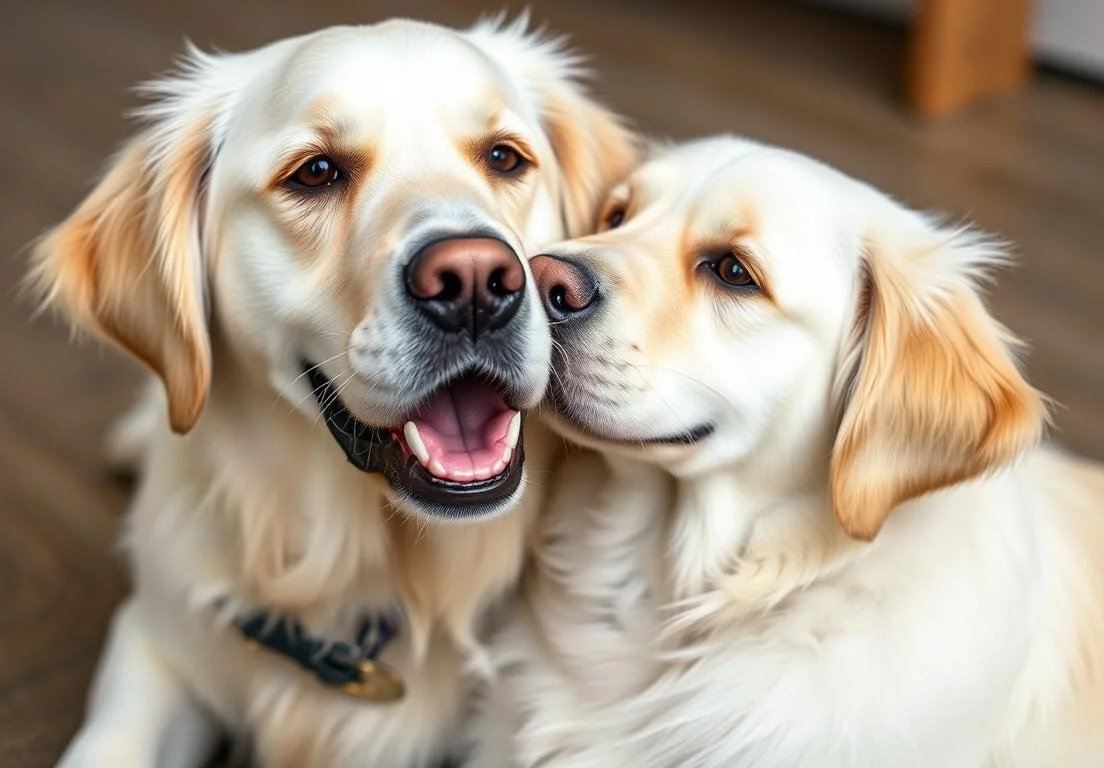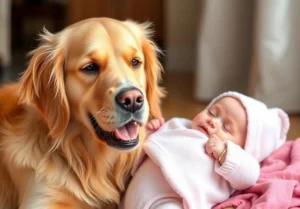The right start can transform your Golden Retriever into a self-assured companion for life. Early socialization is more than just playdates; it’s the foundation for a happy, confident dog.
To set your Golden up for a confident life, expose them to various people, environments, and experiences during their critical socialization window, typically between 3 and 16 weeks of age. There’s so much more to discover about the best practices and fun ways to ensure your pup is well-adjusted and happy, so keep reading to uncover more insights!

Why is Early Socialization Important?
Early socialization sets the foundation for a confident Golden Retriever . It’s a crucial period where puppies are most receptive to new experiences, helping them grow into well-adjusted adults. During the first few months of life, a puppy’s brain is like a sponge, absorbing everything around them. If they’re not exposed to a variety of people, animals, and environments during this period, they might grow up timid, anxious, or even aggressive.
Studies show that lack of socialization can lead to behavioral issues later on, such as fearfulness or aggression towards strangers or other dogs.
Research indicates that puppies undergo a critical socialization window between 3 to 14 weeks of age, during which exposure to various stimuli—including people, environments, and other animals—is essential for developing appropriate social behaviors. Insufficient socialization during this period can result in adult dogs exhibiting fear-based responses and aggression in unfamiliar situations. Signs of poor socialization in dogs include a tendency to exhibit anxiety, avoidance behaviors, excessive barking, and difficulties interacting with humans and other dogs. Addressing these issues early through positive reinforcement training and gradual exposure to new experiences can significantly help enhance a dog’s social skills and reduce the likelihood of behavioral problems later in life.
Early socialization helps prevent these problems by familiarizing them with different situations, thereby reducing anxiety and enhancing their adaptability. A well-socialized Golden is not just more pleasant to be around; they’re also likely to be happier and more relaxed in new situations.
This creates a more harmonious home life for everyone involved.
What Are the Key Socialization Experiences?
For your Golden Retriever to flourish, they need various socialization experiences. Focus on providing a mix of interactions and exposures to ensure a well-rounded development. Here’s a handy list of essential experiences:
-
People : Introduce them to various individuals—kids, seniors, and people of different ethnicities. These encounters help them learn that not everyone is the same, fostering a friendly demeanor.
-
Other Dogs : Arranging playdates with other dogs (especially vaccinated ones) exposes your pup to different temperaments, helping them understand doggie language better.
-
Different Environments : Take them on car rides, visits to parks, or even busy streets. Varying their environment builds adaptability, reducing the chances of environmental stress later in life.
-
Sounds and Surfaces : Get them used to different sounds, like vacuum cleaners, sirens, and the hustle and bustle of a city. Additionally, walking on various surfaces—from grass to gravel—can help them navigate the world with confidence.
-
Handling and Grooming : Frequent handling, like touching their paws, ears, and mouth, conditions them for regular grooming sessions and vet visits, making these more comfortable experiences.
Integrate these socialization experiences into your routine, and you’ll watch your Golden Retriever blossom into a confident, well-rounded companion. Remember, each positive experience will boost their confidence, shaping them into delightful members of your family.
How Can You Introduce Your Golden to New Experiences?
Gradually introducing your Golden Retriever to novel experiences is key to nurturing a well-rounded and confident dog. Creating positive associations early on lays a solid foundation for their socialization.
Start with controlled environments. Take your puppy to a quiet park or your backyard. Introduce them to different sights and sounds, like bicycles passing or children playing from a distance. Allow them to observe at their own pace before getting closer. Reward them with praise or treats when they stay calm.
Incorporate various textures and surfaces into their exploration. Walk them on grass, sand, gravel, and even pet-friendly mats, ensuring they feel stable and secure. Familiarize them with household noises like vacuum cleaners and dishwashers. Play these sounds at a lower volume initially. Gradually increase the volume as they grow comfortable, rewarding calm behavior with their favorite treats.
Socialization trips to pet-friendly stores or cafes can be excellent for meeting new people and pets. Just ensure these environments are not overwhelming. If your pup shows signs of stress, it’s best to leave that situation.
Lastly, puppy classes are fantastic for learning basic commands, meeting other dogs, and teaching proper manners. These group settings can boost their confidence while also offering valuable interactions.
What Activities Promote Confidence in Your Golden?
Building confidence in your Golden Retriever through engaging activities hones their abilities and strengthens your bond. Here are some specific activities that work wonders:
Obstacle courses : Create a simple course with household items, like boxes and chairs. Encourage your pup to navigate through or jump over. This not only offers physical stimulation but also reinforces their problem-solving skills.
Set up a simple course in your living room using a few chairs and boxes. Guide your dog through the course, encouraging them to jump over or crawl under the obstacles. As they successfully navigate the course, they’re not just exercising physically; they’re also engaging their brain to solve the challenges presented. This process can enhance their problem-solving skills as they learn how to approach each obstacle, thus affirming the claim that such activities reinforce problem-solving capabilities.
Interactive games : Try hide and seek. Hide somewhere in your house, call your pup, and let them find you. It’s a fun way to build their confidence as they figure out how to engage in a “hunt.”
Trick training : Teaching your dog new tricks, like rolling over or playing dead, not only serves as a great bonding exercise but also boosts their self-esteem. Use positive reinforcement to reward them with treats and verbal praise.
Social outings : Regularly arrange playdates with well-behaved dogs. This allows your Golden to learn valuable social cues while interacting with their peers. Set the stage by considering the temperament of both dogs.
Using a variety of toys : Try different toys, such as tug ropes, squeaky balls, or puzzle toys. This encourages them to explore and engage with their environment, promoting mental stimulation.
By incorporating these activities into your routine, you’re not just having fun—you’re equipping your pup with the tools they need for a confident life.
How Can Puppy Classes Help with Socialization?
Puppy classes are a fantastic way to jumpstart your Golden Retriever’s socialization process. These classes provide a structured environment where your pup can interact with other dogs and meet new people—a key aspect of building confidence.
In these classes, your Golden will encounter various sounds, smells, and experiences that help them adapt to the world. Engaging with other puppies teaches important play skills and helps prevent future behavioral issues. It’s not just about letting them play; it’s about creating positive associations. Controlled settings allow them to learn to respond appropriately to different stimuli without feeling overwhelmed.
Instructors are typically skilled in positive reinforcement techniques, making it easier for your pup to learn commands and good behaviors through fun games.
Instructors in puppy training classes emphasize the use of positive reinforcement techniques, which focus on rewarding desired behaviors to encourage their repetition. This approach not only helps dogs learn commands more effectively but also enhances the bond between the dog and the owner. Engaging training sessions that incorporate fun games and interactive elements can significantly improve the learning experience. Positive reinforcement has been shown to create a safe environment where puppies feel secure and confident, facilitating better learning outcomes. Studies indicate that this method can result in lower stress levels and greater long-term retention of learned behaviors in dogs. For more insights on positive reinforcement, you can check out our guides.
Additionally, these classes often address common challenges like leash pulling or jumping, equipping you with tools to manage everyday situations.
Make sure to choose a class that emphasizes socialization, where your puppy can safely explore interactions while still being guided by a knowledgeable trainer. The connections formed during these early experiences will significantly shape how confident and comfortable your Golden becomes in various situations—setting them up for a well-rounded life.
What Should You Avoid During Socialization?
Socialization requires care and insight. Making mistakes early on can create hurdles for your puppy’s confidence. Here are key things to steer clear of:
-
Overwhelming Environments : Busy, chaotic places can frighten your puppy. Start with quieter settings where experiences are more manageable.
-
Negative Experiences : One bad encounter with another dog or a loud noise can stick with your pup. Always watch for signs of fear or stress and remove them from situations if needed.
-
Too Much Indoctrination : While it’s great to expose your puppy to new things, forcing them into overwhelming situations can backfire. Let them choose to engage at their own pace.
-
Lack of Reassurance : If your pup seems scared, shushing or scolding them won’t help. Instead, offer a calm, reassuring presence. Use treats and affectionate tones to reinforce their courage.
-
Neglecting Varied Experiences : Exposure should be diverse. Focusing only on humans or just dogs limits your puppy’s adaptability. Make sure they experience various environments—parks, pet-friendly stores, and different types of people.
-
Ignoring Body Language : Learning to read your puppy’s body language is crucial. Signs of stress, such as ears back or tail tucked, indicate they need a break, not more exposure.
-
Skipping Basic Training : Socialization isn’t just about playdates; it includes basic obedience training. A puppy who understands simple commands is more confident in various situations.
By steering clear of these pitfalls, you’ll help cultivate a well-adjusted, confident Golden Retriever ready to tackle life’s adventures.
How Does Socialization Impact Behavior Issues?
Early socialization plays a crucial role in shaping a Golden Retriever’s temperament. Dogs that aren’t properly socialized run a higher risk of developing behavioral issues like aggression and anxiety. Early exposure to a variety of people, environments, and other animals helps to build a foundation of confidence.
Without this exposure, a Golden Retriever may react fearfully or aggressively to unfamiliar situations, which can lead to unwanted behaviors later in life. Studies show that puppies who participated in socialization classes or frequent outings were less likely to exhibit signs of anxiety and aggression as adults (source: American Kennel Club).
When puppyhood fills up with positive experiences, you’re setting the stage for a well-rounded adult dog who is comfortable in different social settings. Engaging them early on gives them the tools they need to process new environments, leading to a more relaxed and confident demeanor.
What Are Some Fun Socialization Ideas?
Creating enjoyable experiences for your Golden Retriever while socializing is key to keeping stress levels low. Here are some fun ideas to enhance your pup’s socialization:
-
Visit Dog Parks: Let your puppy meet other dogs in a safe and controlled environment. Focus on positive interactions.
-
Puppy Classes: Enroll in local obedience or puppy socialization classes. They offer structured play and learning.
-
Arrange Playdates: Set up playdates with friendly, vaccinated dogs. This fosters a safe and relaxed atmosphere.
-
Varied Walks: Change your walking routes often. Exposing them to different sights, sounds, and smells keeps it exciting.
-
Public Outings: Take your Golden to pet-friendly stores, cafes, or outdoor events. This helps them mingle with various people and stimuli.
-
Car Rides: Start familiarizing your puppy with car rides. Aim for enjoyable trips to parks or playdates, making the car a positive experience.
-
Introduce New People: Invite friends over to meet your pup, encouraging gentle interaction with different types of people.
-
Enrichment Activities: Set up play stations that include new toys or scents to stimulate their curiosity and build confidence in exploring.
-
Attend Community Events: Participate in local dog fairs or charity walks to help your pup experience crowds and various activities.
By mixing these activities into your routine, you’re creating a vibrant social tapestry for your Golden Retriever, ensuring they grow up to be a friendly, well-adjusted companion.
What the Research Says About Puppy Socialization
Early socialization is crucial for setting your Golden Retriever up for a confident life. Recent studies underscore that the sensitive period for socialization, generally between 3 to 14 weeks, is when puppies are most receptive to new experiences. A well-cited study by the American Veterinary Society of Animal Behavior (AVSAB) emphasizes that puppies who engage with varied environments, people, and other animals during this time are less likely to develop behavioral problems later on.
The long-term benefits of socialization can’t be overstated. For instance, research shows that socialized puppies exhibit lesser signs of fear and anxiety as adults, which greatly reduces the risk of aggression or other behavioral issues. Untouched puppies, on the other hand, are more prone to noise phobias and separation anxiety.
In a fascinating study published in Frontiers in Veterinary Science, puppies who were exposed to different stimuli had a significantly lower likelihood (up to 70%) of being fearful when they encountered new situations as adults. This means that a properly socialized pup won’t just be happy around people but will also thrive in diverse environments, from parks to bustling city streets.
Moreover, socialization impacts the development of critical traits—like confidence and adaptability. A well-socialized Golden will be able to handle the ups and downs of life without undue stress. This includes everyday encounters, whether it’s meeting another dog at the park or responding calmly to the sound of construction outside.
Investing time during that early window can pay dividends. It’s about creating positive experiences that form a solid foundation for a happy and emotionally strong adult dog.
Alex, a passionate animal lover, has experience in training and understanding animal behavior. As a proud pet parent to two dogs and three cats, he founded AnimalReport.net to share insights from animal experts and expand his knowledge of the animal kingdom.




